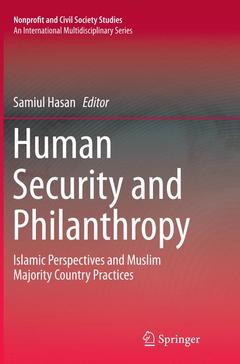Description
Human Security and Philanthropy, 2015
Islamic Perspectives and Muslim Majority Country Practices
Nonprofit and Civil Society Studies Series
Coordinator: Hasan Samiul
Language: English
Subject for Human Security and Philanthropy:
Support: Print on demand
Publication date: 04-2015
362 p. · 15.5x23.5 cm · Hardback
Description
/li>Contents
/li>Biography
/li>Comment
/li>
Section 1: The Introduction and Theoretical Framework.- Chapter 1: Muslim Majority Countries, Philanthropy, and Human Security: Concepts, and Contexts- Samiul Hasan.- Chapter 2: Human Security in A Globalised World: Concepts and Issues for the Muslim World- Ishtiaq Hossain and AdamsIsiaka Abiodun.- Chapter 3:Islam, Property, and Philanthropy: Ethical and Philosophical Foundations and Cultural Influences- Samiul Hasan.- Section 2: Philanthropy and the third sector in the MMCs: Policy, Legal Framework, and Challenges.- Chapter 4: Philanthropy, Laws, and the Third Sector Growth: Analyses from MMCs- Samiul Hasan.- Section 3: Muslim Philanthropy in MMCs: Situational Analyses.- Chapter 5: Muslim Philanthropy: Praxis and Human Security across Muslim Majority Countries- Samiul Hasan.- Section 4: Third Sector Organizations and Human Security in MMCs: Extent, and Dimensions.- Chapter 6: Modern Third Sector Organizations in MMCs: People, Property, Mutuality- Samiul Hasan.- Chapter 7: The Waqf and Human Security in Muslim Majority Countries: Traditions, Practices, and Prospects- Niaz Ahmed Khan and Sultana Jareen.- Chapter 8: Microfinance Institutions, and Human Security in Muslim Majority Countries: Achievements and Challenges - Fatima Rasheed.- Section 5: Human Security in MMCs: Situational Analyses.- Chapter 9: Water, Gender, Philanthropy, and Human Security: Courses and Concerns in MMCs - George Odhiambo.- Chapter 10: Education and Health for Human Security in MMCs: Achievements and the Third Sector Interventions- Shahadut Hossain and Zahirul Hoque.- Chapter 11: Decent Work for Human Security in Muslim Majority Countries (MMCs) - Mohammad Zulfan Tadjoeddin.- Section 6: Conclusions and Recommendations.- Chapter 12: Philanthropy and Human Security in MMCs: Characteristics and Challenges- Samiul Hasan.



